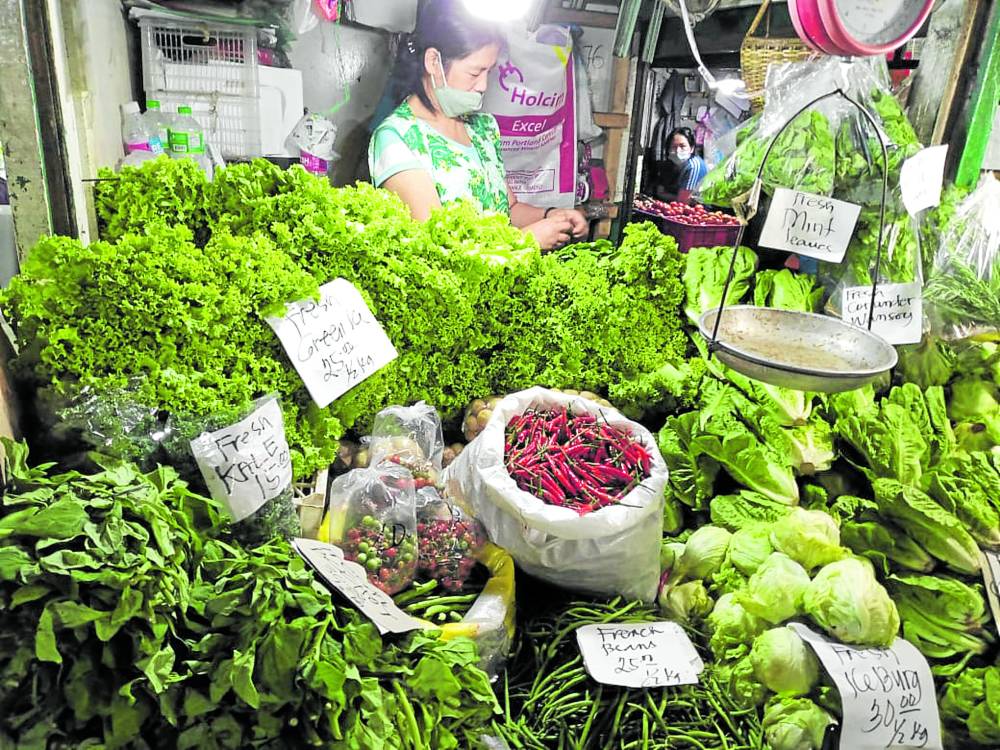
SELL ONLINE A stall at the Baguio City Public Market sells newly harvested vegetables from upland farms in Benguet province in this photo taken on Tuesday. Online selling is an option to help farmers earn more, as it did to small businesses in the Cordillera region during the pandemic. —ALLAN MACATUNO
BAGUIO CITY—Small business owners and family enterprises in the Cordillera region shifted quickly to online sales to survive the economic disaster wrought by the COVID-19 pandemic, earning P355 million in 2020 alone, according to the Philippine Statistics Authority (PSA).
Nearly all businesses shut down their physical stores during the 2020 Luzon lockdown and pandemic-related quarantines, but micro, small and medium enterprises (MSMEs), and big companies in the region were able to double their P146.34 million in e-commerce earnings in 2019, Aldrin Federico Bahit Jr., the PSA chief statistician for the Cordillera, said on Thursday.
Bahit presented the Cordillera results of the 49th Annual Survey of Philippine Business and Industry at a briefing with school heads, local businessmen and government officials.
He said small businesses earned 99.7 percent (P353.6 million) of their revenues from online transactions.
Despite reduced manpower and operating establishments, “the service sector generated more income through e-commerce sales,” Bahit noted.
By comparison, the whole country saw its e-commerce revenues plunge by 29 percent from P170 billion in 2019 to P120.6 billion the following year when COVID-19 broke out.
Rise of delivery riders
“We saw many delivery riders do business in 2020 when everyone started selling online,” Bahit said, adding that this showed how quickly entrepreneurs in Mountain Province, Abra, Ifugao, Apayao and Benguet shifted to internet transactions.
The latest business and industry survey covered registered businesses but excluded family enterprises, such as “sari-sari” (retail) stores or family-owned farms with no employees.
However, accounts collected by various agencies revealed that upland families coped with the economic slump by bartering, and eventually selling items, such as home-baked cookies in their neighborhoods through social media or text messaging, although these transactions were too small and too informal to track.
The online trade developed its own supply chain, and a business start-up in Ifugao, for example, earned in 2020 by providing boxes to fellow entrepreneurs who offered baked goods online.
Slowdown
Bahit said the survey also confirmed how badly the Cordillera’s economy suffered during the first pandemic year.
The quarantines led to a 17.6-percent reduction in the number of Cordillera business establishments from 5,097 in 2019 to 4,200 in 2020.
Among the reasons cited for the dwindling number of businesses at the height of the health crisis were the prolonged suspension or outright closure of wholesale, retail, and repair shops (down to 1,493 in 2020 from 2,120 in 2019); accommodation and food service facilities (from 842 to 696 stores); and real estate activities (from 111 to 71).The business slowdown displaced 19,555 workers in the region when employment slid from 103,421 workers in 2019 to 73,866 in 2020, Bahit added.
The survey also collected information on 1,625 “unpaid workers,” some of whom might be relatives working for their family business.
The PSA data showed that the region’s total revenue slumped to P213.27 billion in 2020, or a 21.6-percent drop compared to 2019’s P271.97 billion in total earnings.
Poverty incidence
The preliminary results of the PSA’s 2021 Updating of the List of Establishments (ULE), which is conducted every three years, showed that more than 1.08 million establishments were in operation and generated 8.57 million in employment nationwide.
Compared to the results of the 2018 ULE, the number of establishments increased by 7.7 percent while total employment declined by 5.2 percent.Bahit said the high e-commerce revenues might also explain the decline last year in the number of Cordillera’s poor during the pandemic.
The region’s poverty incidence in 2021 was 6.9 percent, which meant that seven of every 100 Cordillera residents were poor, or lower than the 8.6-percent poverty incidence recorded in 2018.
These findings were also reflected in the 2021 Family Income and Expenditure Survey, which showed families with the lowest income earned more, proving upland communities “coped very well with the pandemic,” according to Bahit.
Highland agriculture should be redirected toward e-commerce given that this sector generated zero online earnings in 2020, he said.
But the Cordillera vegetable trade appeared to be on track for a rebound, with the value of the vegetable trade rising to P14 billion from January to Nov. 9 this year, said Cameron Odsey, Cordillera director of the Department of Agriculture.
Speaking at a Good Agricultural Practices Summit on Wednesday, Odsey said farmers who grow salad vegetables, such as carrots, beans, lettuce, cabbages and potatoes in Benguet, Mountain Province and Ifugao could generate up to P17 billion by year’s end. INQ
RELATED STORY:
Bongbong Marcos to Cambodia business leaders: We’re steering PH economy in right direction

